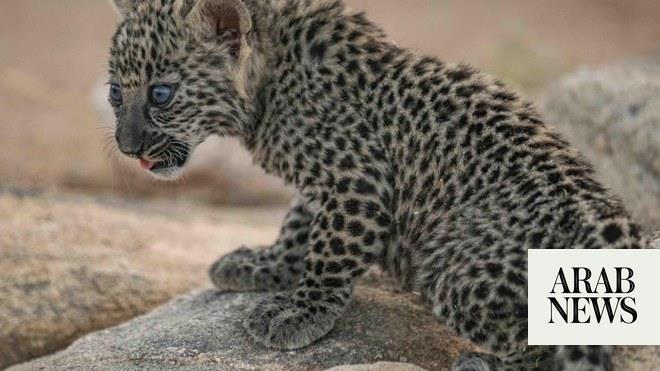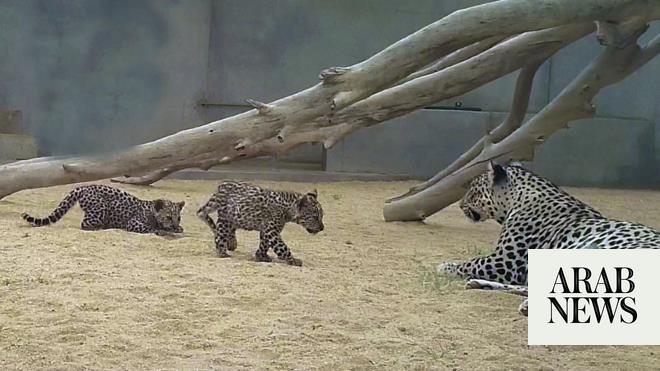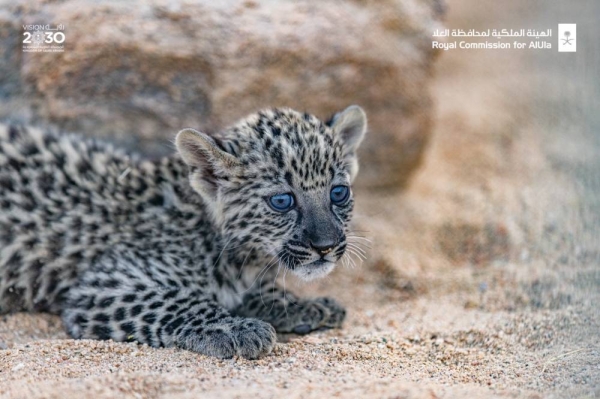
JEDDAH: The Royal Commission for AlUla has successfully overseen the births of seven Arabian leopard cubs in 2023, marking a significant breakthrough for its Conservation Breeding Programme.
The births are a crucial milestone for the initiative, which aims to see the breed’s “critically endangered” status — as designated by the International Union for Conservation of Nature — removed.
All seven cubs were born at RCU’s Conservation Breeding Centre in Taif, Saudi Arabia. Since welcoming the new arrivals over the past five months, the center has seen its total number of Arabian leopards increase to 27 — almost double the 14 present when the conservation project began in 2020.
The long-term goal of reintroducing Arabian leopards to the wild ties in closely with the comprehensive restoration of AlUla’s natural environment, in line with the objectives of Saudi Vision 2030.
It is estimated there are fewer than 200 wild leopards remaining on the Arabian Peninsula, placing it firmly on IUCN’s Red List. The UN has designated Feb. 10 as International Arabian Leopard Day in recognition of the importance of preserving the species.
Abdulaziz Alenzy, RCU Breeding Centre manager, said: “We are all delighted to see seven new Arabian leopard cubs born safely and doing well at RCU’s Conservation Breeding Programme. This is another important milestone in our ongoing efforts to conserve the species by increasing the population each year and reach our ultimate goal of reintroducing leopards back into the wilds of AlUla and broader Arabia.”
The Conservation Breeding Programme welcomed three cubs last year, so seven is significant progress. Of the latest arrivals, five are currently being nurtured by their mothers without any intervention from center staff, who are keeping their distance to ensure fostering of a strong maternal bond.
The remaining two cubs are being cared for by RCU staff after they were abandoned by their mother. While this is a natural and frequent occurrence both in captivity and in the wild, the newborns were promptly moved from their enclosure and the mother’s behavior closely monitored.
Alenzy added: “Obviously it is better if the mother bonds with her cub and raises it naturally. But sometimes, often with new mothers, there is a chance she might abandon it due to a lack of experience. In the wild, she could leave it for dead. As the Arabian leopard is such an important species and a critically endangered animal, we have taken the decision to step in.
“Cubs that are hand-reared are just as important as those raised by their mothers. They need to be introduced back to the other leopards, which requires special training and lots of patience. After five to six weeks, we place them back in the enclosure for a few hours each day to reintegrate them. We also move them from milk to solid food — it can be a demanding process, but it shows how important it is to save each cub.”
Moving the cubs to a specially designated nursery not only reduces the chance of any harm of accidents involving their mother, but also significantly increases their chances of survival during the early stages of their lives.
A dedicated staff member will hand-rear the cubs in line with strict conservation protocols, staying with them constantly, sleeping nearby and feeding them every two hours or so.
The leopards are also monitored round the clock by RCU’s Conservation Breeding Centre team via CCTV cameras.












